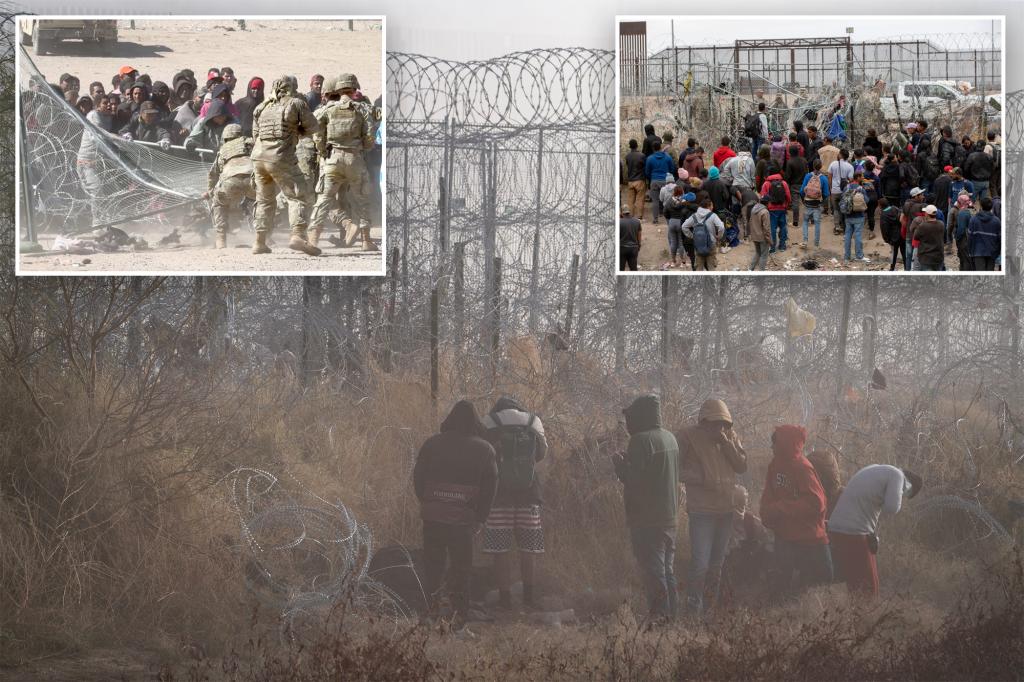The Tren de Aragua (TdA), a violent Venezuelan prison gang, is escalating its efforts to infiltrate the United States through the El Paso, Texas border, raising serious concerns among law enforcement officials. A leaked Texas Department of Public Safety memo details a recent incident where 20 TdA members, armed with knives, tire irons, and broken bottles, attempted to force entry at a border gate. Intelligence suggests further attempts are planned, particularly around New Year’s Day, with the gang reportedly expressing intent to harm National Guard soldiers stationed at the border, especially when they are isolated. This surge in aggressive behavior is attributed to the gang’s desire to establish a stronger presence in the US before the incoming presidential administration implements potentially stricter border control policies. The gang appears to be capitalizing on the current political transition, exploiting what they perceive as a window of opportunity before stricter enforcement measures are put in place. This desperation is fueling their increasingly violent tactics, posing a significant threat to border security and the safety of both border patrol agents and National Guard personnel.
The TdA’s increasingly brazen attempts to breach the border are marked by a surge in violence, including increased gunfire and the use of pepperballs by authorities to deter the aggressive incursions. This escalating tension resonates with a previous incident in March where over 200 migrants, some allegedly TdA members, violently clashed with National Guard soldiers, highlighting the gang’s willingness to engage in physical confrontation to achieve their objectives. El Paso’s strategic location as a TdA hub, with members often transiting through the city before dispersing to other parts of the US, including New York City and Aurora, Colorado, underscores the significance of this border region in the gang’s operations. Their collaboration with Mexican cartels to facilitate smuggling operations further complicates the situation, creating a network that enables the gang to expand its reach and influence within the United States. This dangerous alliance amplifies the threat posed by the TdA, combining the gang’s violent tendencies with the cartel’s established smuggling infrastructure and resources.
The TdA’s motives extend beyond mere economic gain from smuggling operations. Retired Homeland Security Investigations agent Victor Avila suggests an anti-American ideology akin to terrorist groups, driven by a desire to disrupt and undermine American society. This ideological component adds a layer of complexity to the gang’s operations, suggesting a deeper, more insidious threat than traditional criminal activity. Avila argues that the gang’s actions are potentially directed by instructions from Venezuela, reflecting a broader, politically motivated agenda aimed at destabilizing the US. This perspective paints a concerning picture of the TdA as a potential proxy force engaged in a form of asymmetrical warfare, leveraging criminal activities to advance a broader anti-American agenda.
Texas Governor Greg Abbott’s declaration of the TdA as a foreign terrorist organization underscores the severity of the threat posed by the gang. This designation reflects the state’s recognition of the TdA’s violent tactics, its potential connections to foreign actors, and its broader destabilizing agenda. The deployment of additional law enforcement resources to combat the gang’s growing presence in Texas and the implementation of a mandatory 10-year minimum sentence for TdA smugglers further demonstrate the state’s commitment to addressing this issue. These measures aim to disrupt the gang’s operations, deter further criminal activity, and protect Texas citizens from the escalating threat posed by the TdA. Abbott’s strong stance underscores the state’s determination to prevent Texas from becoming a base of operations for the gang’s activities.
The TdA’s escalating violence at the El Paso border presents a complex challenge for law enforcement and border security. The gang’s aggressive tactics, coupled with its potential ideological motivations and alliances with Mexican cartels, create a volatile situation with far-reaching implications. The urgency of the situation is further amplified by the impending change in presidential administration, which the gang appears to be attempting to exploit. The TdA’s strategic focus on El Paso highlights the city’s vulnerability and underscores the need for robust security measures to protect both border agents and the local community. Addressing this multifaceted threat requires a comprehensive approach involving increased security measures, enhanced intelligence gathering, and targeted law enforcement operations to disrupt the gang’s networks and prevent further infiltration.
The potential consequences of unchecked TdA activity within the US are significant, ranging from increased violence and crime to potential disruptions to community stability and economic activity. The gang’s reported intentions to “take over businesses, stores, and apartment complexes” indicate a broader ambition beyond simple criminal enterprise, suggesting a desire to establish territorial control and exert influence within communities. This raises the specter of a more pervasive and disruptive presence within the country, potentially leading to widespread fear and insecurity. The urgent need for effective countermeasures is underscored by the potential for the TdA’s activities to escalate further, posing a serious threat to public safety and national security. A comprehensive and coordinated response is essential to mitigate this evolving threat and protect communities from the destabilizing influence of this increasingly brazen and violent organization.










